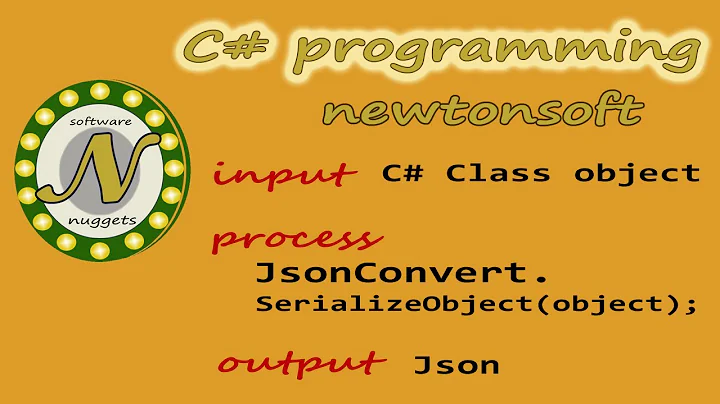Newtonsoft Json.Net serialize JObject doesn't ignore nulls, even with the right settings
A "null" value in a JObject is actually a non-null JValue with JValue.Type equal to JTokenType.Null. It represents a JSON value of null when such a value actually appears in the JSON. I believe it exists to capture the difference between the following two JSON objects:
"source2": {
"z": null
}
"source2": {
}
In the first case, the property "z" is present with a null JSON value. In the second case, the property "z" is not present. Linq-to-JSON represents the first case with a null-type JValue rather than having JProperty.Value actually be null.
To prevent null tokens from creeping into your JObject's values, use the appropriate serializer setting when creating the JObject from some POCO:
var jobj = JObject.FromObject(new
{
x = 1,
y = "bla",
z = (int?)null
}, new JsonSerializer { NullValueHandling = NullValueHandling.Ignore } );
(Note the POCO must not itself already be a JObject. The untyped method(s) JsonConvert.DeserializeObject(jsonString) or JsonConvert.DeserializeObject<dynamic>(jsonString) will by default return a JObject when root JSON container in jsonString is a JSON object.)
Related videos on Youtube
xlecoustillier
R&D software architect, software developer, mostly .NET, Java/Kotlin and Javascript/Typescript Functional programming & JS stack enthusiast
Updated on September 16, 2022Comments
-
xlecoustillier over 1 year
I'm trying to serialize an object using Newtonsoft Json.Net.
This object is an anonymous type filled with a lot of heterogenous things, mainly regular POCOs, but also some
JObjects orJArrays.The thing is that when adding the
NullValueHandlingproperty toNullValueHandling.Ignore, every null property gets ignored, but only if it's part of a "regular" .Net object. Every null property inside aJObjectorJArrayremains.Here's a minimal example:
var jobj = JObject.FromObject(new Anything{ x = 1, y = "bla", z = null }); var poco = new Foo { foo1 = "bar", foo2 = null }; var serialized = JsonConvert.SerializeObject(new { source1 = poco, source2 = jobj }, Newtonsoft.Json.Formatting.None, new JsonSerializerSettings { NullValueHandling = NullValueHandling.Ignore});Is there a simple way to ignore those null values as well ? Did I miss some setting option ? Or do I have to deal with it manually ?
-
Jon Skeet about 9 yearsIt would really help if you could provide a short but complete program demonstrating the problem.
-
 Binkan Salaryman about 9 yearsA skipped
Binkan Salaryman about 9 yearsA skippednullentry of an array would change the indices; in this case you need to deal with it manually. -
erikkallen about 9 yearsThis code can't compile because 1) there is no Foo type (no, this is not nitpicking because the problem could potentially be in the definition of that type somehow), and 2) You can't assign the null literal to an anonymous type property.
-
-
xlecoustillier about 9 yearsAs simple as that. Thanks a lot!
-
Fawad Raza over 7 yearsThis doesn't work when anonymous object has a property of Array, which has objects with null property, basically, this does not check recursively.
-
dbc over 7 years@Fwd079 - it does check recursively, but the setting does not apply to collection entries. From the docs: Ignore: Ignore null values when serializing and deserializing objects. To skip specific collection entries, see maybe Excluding specific items in a collection when serializing to JSON or JSON.Net custom contract serialization and Collections
-
 Brian Rogers over 5 years@Artemious See JSON.NET serialize JObject while ignoring null properties
Brian Rogers over 5 years@Artemious See JSON.NET serialize JObject while ignoring null properties -
 Toolkit about 5 yearsam I missing something or this doesn't work at all dotnetfiddle.net/WINNCL
Toolkit about 5 yearsam I missing something or this doesn't work at all dotnetfiddle.net/WINNCL -
dbc about 5 years@Toolkit - your problem is that
JsonConvert.DeserializeObject<dynamic>(str);actually constructs and returns aJObject, see dotnetfiddle.net/beqU8T. If you want to strip null properties from aJObjectsee JSON.NET serialize JObject while ignoring null properties.




![Serialize and Deserialize Json to C# [Step By Step Tutorial of JSON in C#]](https://i.ytimg.com/vi/hLYHE1kIOpo/hq720.jpg?sqp=-oaymwEcCNAFEJQDSFXyq4qpAw4IARUAAIhCGAFwAcABBg==&rs=AOn4CLCwFkI7YDaizcmvb-xMAdIPTDYX-A)




